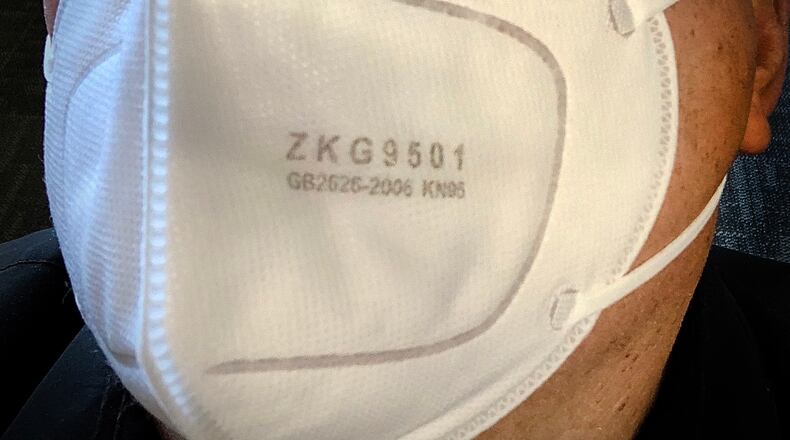Tips for individuals
- Upgrade your mask. For the best protection, the CDC now recommends wearing an N95 or KN95, which will give much higher protection for longer periods. They are especially recommended if you have a job where you interact with lots of people, like a grocery store worker; if you spend long periods in crowded indoor spaces; if you’re at high risk of getting severely ill from the coronavirus, or if you’re not up-to-date on your vaccination.
- Even if you can’t snag a N95, there are ways to significantly improve other masks. Surgical masks are more protective than cloth, and adding a cloth mask on top can create a better fit, making them even more effective. Another way is to knot each ear loop and tuck in the extra material on the edge, which can give you a closer fitting masks (the CDC has a demonstration video on its YouTube page).
- If you’re having trouble wearing a mask for a long time, such as for a whole shift at work, the 3M Aura has some of the best reviews when it comes to comfort, if you can find one.
- You can also try nonprofit projectn95.org if you need help finding masks, respirators and other supplies. This shop has vetted stock from masks to other PPE.
- The costs of masks can add up. However, if you have an HSA/FSA account, you can use it to pay for medical masks. Already bought some a while ago? Reimburse yourself; there’s not a time limit with an HSA account.
- The White House is distributing 400 million free N95 masks (up to three per person, as long as they are available). Check with your local Meijer, Kroger or Walgreens, and expect some more locations to join in as the program is rolled out.
- You can order up to four free COVID-19 tests shipped to your home via online ordering at covidtests.gov or call 800-232-0233.
- People with private health insurance can now also get up to eight rapid at-home tests paid for a month. Medicaid was already covering tests. Note that we’ve previously reported on some big gaps in this policy: Medicare and Tricare aren’t required to cover these at-home tests.
- There are ways on many different budget levels to improve ventilation when gathering with friends, which can make a difference in lowering the chance of spreading among the group. Among CDC ideas for better ventilation, cracking a window is cheap and effective, though unfortunately not always weather-feasible. Some other options for when gathered with people are to leave the bathroom fan on (or stove fan if it sends air to outside); upgrade HVAC filter to the highest rate of filtration and turn it from “auto” to “on” when you have friends over; or place a portable HEPA air cleaner in the room.
- You can volunteer with the Long-Term Care Ombudsman Program to help nursing home and assisted living residents, by building relationships with the residents, listening to their concerns and helping residents connect with the right resources so they can receive quality care and have their rights protected. And you can always contact the program to get help if you have a concern about your facility or your loved one’s facility. Call 800-395-8267 for the Dayton office (Montgomery, Preble, Greene, Clark, Miami, Darke, Logan, Shelby, and Champaign counties) or Pro Seniors for the Cincinnati region (includes Warren and Butler counties) at 513-345-4160.
- Lastly, while you’ve heard this pitch many times, getting up-to-date on your vaccine remains a key tool when it comes to protection from COVID-19. Vaccines.gov can help you find a shot, whether it’s a first dose or a booster, but also your local public health department or pharmacy remain great resources for this.
In Other News
1
CareFlight nurses, medics demand contract with Premier Health
2
Kings Island power outage on Monday led to some rides closures
3
Lower gas prices projected to increase travel by road, air this...
4
‘We can authentically show up without being afraid.’ Annual Pride event...
5
Dayton schools could end high school transportation over contested...
About the Author

